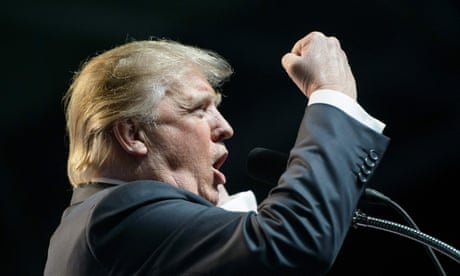SO here we are again, scratching our heads over how everybody got the US elections so wrong, and pondering a future with a narcissistic joker like Donald Trump as the commander-in-chief of the most powerful military on the globe. My early reaction was: stop the world, I want to get off!
But on reflection, we’ve been here before. This is not the first time a rabble-rousing populist has clawed his way to the top. Remember Hitler? He, too, was elected because his message of anti-Semitism and nationalism resonated with Germans who were being squeezed by sanctions imposed by the victorious Allies after the First World War.
Closer to home, we have seen the rise of Altaf Hussain to utter dominion over a liberal, cosmopolitan city like Karachi. He may now be in decline, but for nearly three decades, he wielded more power than most politicians in Pakistan have. He could shut down the city with a word, and allegedly have opponents liquidated with a mere nod.
Many of us in Karachi wondered at this hold he had over his followers. Thousands sat on roads in the blazing sun while he regaled them with bizarre, scarcely comprehensible rants from London while clearly under the influence. For rational, sensible Pakistanis, the whole MQM phenomenon passed all understanding.
The wave of support for Imran Khan is another example of apparently irrational group-think. Why should thousands of educated people camp out in Islamabad for months over allegations of rigging that have been dismissed by the election commission as well as the courts? Why this blind faith in Imran Khan?
Why this blind faith in demagogues?
The reason for failing to comprehend this seemingly illogical behaviour is, I suspect, rooted in our inability to grasp that motives other than logic often drive people. In Trump’s case, he appealed to people not because they necessarily believe that he will bring jobs back, or rid America of Muslims and Mexicans. What resonates is the feeling of empowerment ordinary Americans think they have gained by kicking the liberal elites out of power.
Supercilious and superior, educated, well-heeled types made little attempt to tap into the rage and the angst felt by millions of insecure Americans who felt threatened in a number of ways: unemployment, a demographic shift that will soon reduce white Americans to a minority, and the increasing economic and political power of women. So while there might be nothing rational about a desire to take America back to the 1950s when wages rose and whites were unchallenged, many Trump supporters equated his campaign with a rosy, almost utopian vision of their country.
Similar sentiments were on display during the Brexit campaign in the UK. The Leave supporters insisted they wanted to ‘get control’ of their country. Whatever the economic arguments made by both sides, the driving force behind Brexit had little to do with the promise of prosperity, and more to do with returning the country to an era that had few foreigners.
The MQM phenomenon was about Mohajir identity and empowerment. While the prospect of government jobs was a powerful incentive, the movement was basically driven by a search for pride and dignity. We missed this because we were part of an entitled elite living in our own cocoon.
In our rationality and our complacency, we misread how important they really are to people who have little sense of self-worth. So when a demagogue comes around and channels these elements into a powerful movement that challenges the status quo, we are totally blindsided.
One thing these random examples have in common is that they are all part of a post-truth politics where a demagogue can tell any number of lies without being penalised by voters. The American media, including fact-checking websites, listed the semi-truths and outright lies Trump frequently deployed in his speeches and debates. But for true believers, they were irrelevant to the overall message of redemption and hope.
When truth loses relevance in political debate, it is next to impossible for rational liberals to win. If your opponent can make up whatever he likes to prove his point, either you descend to his level of dishonesty and lose credibility with your constituency, or stick to the truth and lose the argument.
This narrative composed of rumours and fabricated figures rules supreme on 24/7 TV chat shows and the internet. Panellists and bloggers can peddle the most outlandish conspiracy theories and accusations without being questioned. False stories can be planted with ease and go viral. Ill-informed and gullible voters are easily swayed by spin doctors.
So what does this mean for the future of democracy? Clearly, populism and demagoguery are on the march, and liberalism is in retreat. The politics of identity is in conflict with tolerance and inclusiveness. The important thing is to shed our sense of superiority, emerge from our bubbles, and try and understand what people like Trump and Imran Khan represent.




